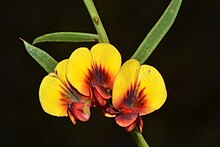Daviesia angulata
| Daviesia angulata | |
|---|---|

| |
| Near Mogumber | |
| Scientific classification | |
| Kingdom: | Plantae |
| Clade: | Tracheophytes |
| Clade: | Angiosperms |
| Clade: | Eudicots |
| Clade: | Rosids |
| Order: | Fabales |
| Family: | Fabaceae |
| Subfamily: | Faboideae |
| Genus: | Daviesia |
| Species: | D. angulata |
| Binomial name | |
| Daviesia angulata | |
Daviesia angulata is a species of flowering plant in the family Fabaceae and is endemic to the south-west of Western Australia. It is an erect, spreading shrub with prickly, flattened phyllodes, and yellow flowers with red markings.
Description
Daviesia angulata is an erect, glabrous, spreading shrub that typically grows to a height of 0.4–1.5 m (1 ft 4 in – 4 ft 11 in). Its leaves are reduced to flattened, sharply-pointed, tapering phyllodes 10–35 mm (0.39–1.38 in) wide and 1–4 mm (0.039–0.157 in) wide. The flowers are arranged in leaf axils in groups of between two and four on a peduncle 2–6 mm (0.079–0.236 in) long, each flower on a pedicel 2–7.5 mm (0.079–0.295 in) long with oblong bracts at the base. The sepals are 2.5–3 mm (0.098–0.118 in) long, the lobes about 0.5 mm (0.020 in) long, the two upper lobes joined in a broad "lip" and the lower three triangular. The standard petal is broadly egg-shaped with the narrower end towards the base and a notched tip, yellow with red markings near the centre and 6–7 mm (0.24–0.28 in) long, the wings yellow, tinged with red and about 7–8 mm (0.28–0.31 in) long and the keel yellow with a red tinge and about 8.0–8.5 mm (0.31–0.33 in) long. Flowering mainly occurs from March to September and the fruit is a triangular pod 9–16 mm (0.35–0.63 in) long.[2][3]
Taxonomy and naming
Daviesia angulata was first formally described in 1839 by John Lindley in the A Sketch of the Vegetation of the Swan River Colony from an unpublished description by George Bentham.[4][5] The specific epithet (angulata) means "angular", referring to the branchlets.[6]
Distribution and habitat
This species of pea mainly grows in jarrah forest and mallee-heath between Eneabba, Busselton, Wongan Hills and Mount Barker.[2][3]
Conservation status
Daviesia angulata is classified as "not threatened" by the Government of Western Australia Department of Biodiversity, Conservation and Attractions.[2]
References
- ^ "Daviesia angulata". Australian Plant Census. Retrieved 1 October 2021.
- ^ a b c "Daviesia angulata". FloraBase. Western Australian Government Department of Biodiversity, Conservation and Attractions.
- ^ a b Crisp, Michael D.; Cayzer, Lindy; Chandler, Gregory T.; Cook, Lyn G. (2017). "A monograph of Daviesia (Mirbelieae, Faboideae, Fabaceae)". Phytotaxa. 300 (1): 270–272. doi:10.11646/phytotaxa.300.1.1.
- ^ "Daviesia angulata". APNI. Retrieved 1 October 2021.
- ^ Lindley, John (1839). A Sketch of the Vegetation of the Swan River Colony. London: James Ridgway. p. xiv. Retrieved 2 October 2021.
- ^ Sharr, Francis Aubi; George, Alex (2019). Western Australian Plant Names and Their Meanings (3rd ed.). Kardinya, WA: Four Gables Press. p. 133. ISBN 9780958034180.
